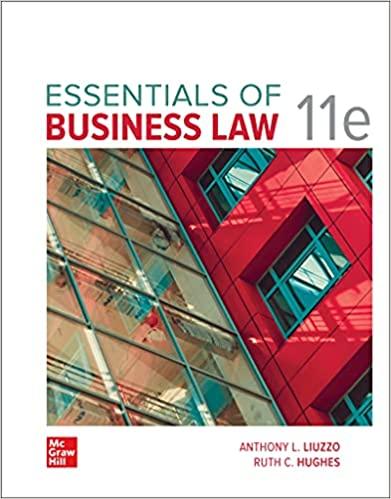Question
1.Which of the following is a type of agency relationship: a. express b.implied c. apparent d. a, b, and c. 2.Authority that is derived from
1.Which of the following is a type of agency relationship:
a. express
b.implied
c. apparent
d. a, b, and c.
2.Authority that is derived from the conduct of the parties, custom and usage of trade, or act that is incidental to carrying out the agent's duties is:
a. Express authority
b. retroactive authority
c. obvious authority
d. implied authority
3.The termination of an employee will be considered a wrongful discharge if the termination was in violation of:
a. statute
b. an employment contract
c. public policy
d. a, b, and c
4.Employers who establish pension plans for their employees are subject to the record keeping, disclosure, and other requirements of:
a. COBRA
b. ERISA
c. FUTA
d. FICA
5.OSHA standards establish rules pertaining to:
a.Minimum wage
b. child labor
c.compensation after a work-related injury
d. construction project safety
6.Workers compensation laws protect an employee
a. If he negligently injures himself on the job
b. If he is injured off the job on a weekend
c. Only If he has coverage under the affordable care act
d. Only if he is a union member
7.The minimum age at which one can work at a hazardous job under the FLSA is
a. 14 with a permit
b.16
c. 18
d. 21
8.A Principal is usually not liable for injuries caused by its agents while they are on their way to or from work. This is called the ________rule.
a. frolic and detour
b.respondeat superior
c. apparent agency
d.coming and going rule
9.__________occurs when a principal accepts an unauthorized contract entered into by its
agent.
a.apparent authority
b) ratification
c.)renunciation
d) implied authority
10.A federal law and agency enacted/created to promote safety in the workplace is knows as
a. the Wagner Act
b. OSHA
c.The Workers Compensation Act
d.None of the above
11.A employee cannot legally be fired if:_________
a) he is fired because of his race, gender, religion or national origin
b) the at will doctrine applies
c) he is fired because of personality conflict with his supervisor
d) he is disabled and no reasonable accommodation can be made for his disability
12.The Civil Right Act of 1964 applies to
a. all employees with 4 or more employees
b) discrimination because of membership in a political party
c) discrimination based on school attended
d) sexual harassment in the workplace
Step by Step Solution
There are 3 Steps involved in it
Step: 1

Get Instant Access to Expert-Tailored Solutions
See step-by-step solutions with expert insights and AI powered tools for academic success
Step: 2

Step: 3

Ace Your Homework with AI
Get the answers you need in no time with our AI-driven, step-by-step assistance
Get Started


